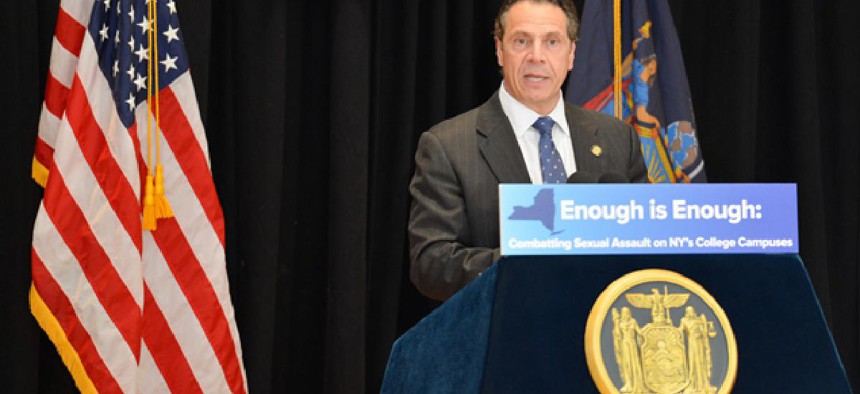“Enough is Enough”: Nonprofits Seek to Partner with Colleges to Increase Sexual Assault Transparency

Organizations that aid victims of sexual violence welcomed recently approved legislation that aims to combat sexual assault on New York college campuses through education. But they say school officials could help the process by being more accountable.
“I think that this is a very prevalent problem on every college campus,” said Meaghan Greeley, a victim advocate for the nonprofit Vera House, Inc., referring to the issues of sexual assault and that most college officials are reluctant to discuss it publicly. “Things like reporting sexual assault hurts their brand.”
New York is among the states with the highest number of sexual assault cases under investigation, according to a report released by the U.S. Department of Education’s Office for Civil Rights. As of June 24, the state had 19 sexual violence cases under investigation out of 132 cases reported nationwide.
“Enough Is Enough,” a bill supported by Gov. Andrew Cuomo and approved on June 17, will establish a uniform statewide policy for handling sexual violence cases on college campuses and provide comprehensive education for college communities, according to a statement released by Cuomo’s office. It will also define “affirmative consent” as “a clear, unambiguous, and voluntary agreement.”
Greeley said Vera House, a Syracuse-based organization that assists victims of sexual violence, has had an ongoing partnership with colleges in Onondaga County, but the bill will allocate more resources to this work. The legislation is expected to provide funding to bolster prevention programs for students, faculty and staff in order to begin to change campus culture.
“Prevention, in general, gets skipped over,” Greeley said. “There isn’t always money to do prevention work.”
She said potential programs could include educating college communities about the concept of “consent” and what it means to be an “empowered bystander.”
“How do we, as community members, become empowered when we see something happening? How do we intervene?” she said. “We all have a stake in this, we are all interested in a safer community.”
Min Um-Mandhyan, director of development and communications at the New York City Alliance Against Sexual Assault, said nonprofits typically work with colleges on various programs related to sexual assault, but when an incident is reported, “they don’t let anybody in…that’s been the problem.” Instead of reaching out to experts who are knowledgeable on the issue, she said colleges and universities frequently attempt to deal with the complaints on their own.
“But schools themselves are not experienced in sexual assault,” she said. “So how can they be the judge of what happened?”
The organization has applied for a grant from the Department of Health and Human Services, which would enable it to partner with seven colleges statewide on implementing “policies around sexual assault and gender-based discrimination,” Um-Mandhyan said. The more than $1 million grant would enable the organization and its partner, the New York State Coalition Against Sexual Assault, to expand their reach and provide more training than resources now permit.
“Primary prevention is important to shifting the paradigm,” she said. “Dealing with the root causes and teaching [colleges] how to talk about these things…looking at all these societal norms that perpetrate sexual violence [against] women and those who are more vulnerable.”
But colleges say they already have comprehensive education programs in place, as well as programs that aid victims of sexual assault.
Karl Luntta, director of media relations at the State University of New York (SUNY) at Albany, which is among the 19 New York colleges under investigation in regard to their response to sexual violence cases, said the school works with a number of outside organizations on sexual assault prevention programs and has a campus-based center with three staff members who are specifically trained to assist victims of sexual violence. Luntta said the school either works with students on campus on issues related to sexual assault, or refers them to outside organizations such as the Albany County Crime Victims and Sexual Violence Center, Equinox or Albany Memorial Hospital, among others.
At Sarah Lawrence College, another school under investigation by the Department of Education’s Office for Civil Rights, Dina Nunziato, director of counseling and psychological services and sexual assault campus liaison, wrote in an email, “Sarah Lawrence College has comprehensive policies and procedures in place to address sexual violence.” Nunziato said the school offers sexual assault prevention training during orientation and throughout the academic year, in addition to partnering with a number of off-campus programs. “We are working this year with WVA (Westchester Victim Assistance Services) to bring the new Mentors in Violence Prevention (MVP) Bystander Training Program to campus for Fall 2015,” Nunziato wrote.
Other New York colleges being investigated are Barnard College, Canisius College, Columbia University, Cornell University, City University of New York Hunter College, Elmira College, Hamilton College, Hobart and William Smith Colleges, Pace University, the Politechnic Institute of New York University, Saint Thomas Aquinas College, St. John’s University, University of Rochester and SUNY campuses at Stony Brook, Buffalo State College, Brockport and Purchase.
Some lawmakers say more legislation is needed at the national level to make colleges more transparent and accountable.
“Right now, some colleges and universities are more inclined to expel a student for cheating on an exam than for committing sexual assault,” U.S. Senator Kirsten Gillibrand (D-N.Y.) said in a Feb. 26 press release announcing the reintroduction of the Campus Safety and Accountability Act, which aims to reform how campuses handle sexual assault cases. “We know this problem is pervasive and too often swept under the rug by institutions that fail students.”
Greeley said she and other victim advocates want to show college and university officials that accountability and transparency could help rather than hurt their brand. But this process involves changing the culture around discussions of sexual assault.
“How do we create incentives for colleges instead of penalties?” she said.
NEXT STORY: Exclusive: Shakeup of Somos Leadership (UPDATED)
